

Mega-SERP: A Visual Guide to Google. The days of 10 blue links are over, and Google's search result pages seem to be evolving on a daily basis.
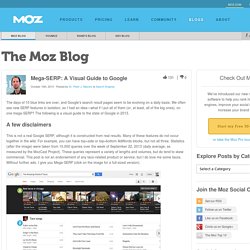
We often see new SERP features in isolation, so I had an idea—what if I put all of them (or, at least, all of the big ones), on one mega-SERP? The Future of Search: 2013 Search Engine Ranking Factors Released. Every two years, Moz surveys over 100 top industry professionals to compile our biennial Search Engine Ranking Factors.
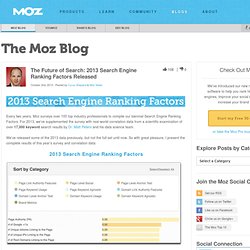
For 2013, we've supplemented the survey with real-world correlation data from a scientific examination of over 17,000 keyword search results by Dr. Matt Peters and his data science team. We've released some of the 2013 data previously, but not the full set until now. SEO experts weigh in: Authorship, social SEO, link building & Schema. July 16, 2013 • written by Laura Crest From time to time we like to feature some of our best guest author content – and you’ll be glad to know that today is just such a time!

Beginning with Eric Enge’s post on what Google’s authorship markup means for SEO, we’ve also included Dana Lookadoo on optimizing content for social sharing, Carrie Hill on how to use Schema markup to stand out in search, and Jon Hall on why link building in the real world requires the work of sales. So here are they are…Savor, bookmark…enjoy! Strings to Things - The move to Semantic SEO - MozCon 2013. Beyond 10 Blue Links: The Future of Ranking. 2013 Search Engine Ranking Factors. Yesterday at MozCon, I presented the results from Moz's Ranking Factors 2013 study.
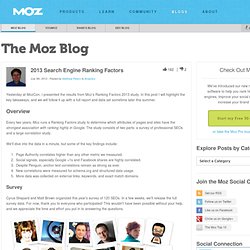
In this post I will highlight the key takeaways, and we will follow it up with a full report and data set sometime later this summer. Overview Every two years, Moz runs a Ranking Factors study to determine which attributes of pages and sites have the strongest association with ranking highly in Google. The study consists of two parts: a survey of professional SEOs and a large correlation study.
We'll dive into the data in a minute, but some of the key findings include: Page Authority correlates higher than any other metric we measured. The Evolution of Search. The Popularity Factor in Today's SEO. Being popular gets you everywhere.

Mindy Kaling (Kelly Kapoor from the American show The Office) talks in her book “Is Everyone Hanging Out Without Me and Other Concerns” about how she imagined getting award show gift bags with vacations to wildlife reserves and $500 jars of miracle face creams made from human placentas. But since she’s not an A-List actor so in reality she would get stuff like protein bars and socks, and sometimes wouldn’t even be allowed into events. It’s not that Mindy isn’t a fantastic person – she is. But she’s simply not as popular as the Meryl Streeps and Angelina Jolies of the world. Is Human Engagement Google’s New Ranking Factor for 2013? A lot has changed in the search engine optimization (SEO) industry during the past year.
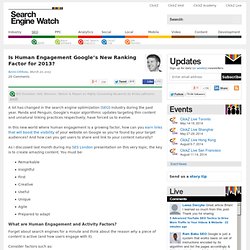
Panda and Penguin, Google's major algorithmic updates targeting thin content and unnatural linking practices respectively, have forced us to evolve. In this new world where human engagement is a growing factor, how can you earn links that will boost the visibility of your website on Google so you're found by your target audiences? And how can you get users to share and link to your content naturally? As I discussed last month during my SES London presentation on this very topic, the key is to create amazing content. You must be: RemarkableInsightfulFirstCreativeUsefulUniqueAgilePrepared to adapt. Top Five SEO Mistakes of 2013. The face of SEO has changed, and time will tell if it’s for the better.
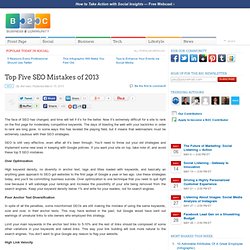
Now it’s extremely difficult for a site to rank on the first page for moderately competitive keywords. The days of blasting the web with your backlinks in order to rank are long gone. In some ways this has leveled the playing field, but it means that webmasters must be extremely cautious with their SEO strategies. The Paradox Of New Vs. Old SEO. SEO is at a crossroads.

Everything in the search industry is continually changing: Google is rolling out new algorithms, tools, and products; Bing is partnering with Facebook in ever more interesting ways; SEO toolsets are being forced to change their approach; and techniques used by SEOs are continually being re-visited to test their validity. Yet, there’s a paradox that exists amidst this feverish pace of change: classic, boring, “old SEO” is still what works best. Now, before you publicly flagellate me for sounding off with such sacrilegious puffery, please continue reading.
Signs Of Evolution There are, no doubt, some striking developments in search. Google’s shopping blend is now paid, PLAs account for nearly 30% of non-brand paid search for e-commerce sites, Panda and Penguin dwelt a one-two punch to short-term SEO and paid links, and we see glimpses of the future in authorship, Google+ and the Knowledge Graph. The Future Of Search Is Anticipatory Search. Microsoft has been doing these interviews with technology news sites to try to create some buzz around their search engine, Bing.

They did one at The Verge and a few others like AllThingsD. Here is one snippet from the article I wanted to highlight: Matt Cutts on What’s Needed for SEO Success in 2013 and Beyond - Live Blogging. SMX West is in its final day and it’s been a great three days of sessions.

Today’s panel, What’s Needed for SEO Success in 2013 and Beyond is filled with industry experts including Greg Boser (@GregBoser), Annie Cushing (@AnnieCushing), Janet Driscoll Miller (@janetmiller), Duane Forrester (@duaneforrester), Rae Hoffman (@sugarrae) and Matt Cutts (@mattcutts). Session is getting started with Danny making light of the fact that we had to walk close to a mile to get lunch. Danny’s introducing the panel (see above) with various jokes taken at Matt Cutts’ and Greg Boser’s expense.
Which Top SEO Tactics Will You Focus On In 2013? SEO tactics have morphed again over the past year, including the many Google updates we’ve seen. For nearly any type of business, keeping up with these changes can be a challenge, but if you prioritize the tasks necessary for success in search and social media marketing, the efforts can pay large dividends. Below are my picks for the top SEO tactics to focus on in the coming year. These tactics can bring you more relevant traffic and conversions for improving your bottom line in 2013.
Optimize your pages using SEO best practicesImplement social media tacticsBuild mobile pages and/or mobile appsBuild local pagesOptimize map listings with local landing page URLsOptimize IYPs & data aggregators for consistent data validation & relevant backlinksImprove SERP visibility with semantic markup. How to Do SEO in 2013 - YouMoz. Whether you're new in the game or a seasoned campaigner, you would have noticed by now that Search Engine Optimisation is by no means a walk in the park. Algorithm changes get made a multitude of times annually; 516 changes were made by Google alone in 2010, and they're just the ones they tell us about. As a result, staying on top of the game is quite a task for anyone, individual or team. A lot of consultants in the industry, whether it be by direct implementation or via a series of experiments, have dabbled in the art of tactical play to try and “game the algorithm” to their advantage in some way or another.
One example of this is ‘link building’ – the practice of increasing the quantity of inbound links to any given site. Because one part of the search engine algorithm looks at the quality and quantity of inbound links to a site, if we compare two sites, A and B, we can better ascertain quality, relevance and rank based (not solely) on these inbound links. Time to Shift Focus. Internet trends for marketers. 2013 SEM/SEO Resolutions. 10 Content Experts Weigh in on Author Rank in 2013: Part II by Vertical Measures. Two weeks ago, we shared the first part of this two part post, “10 Content Experts Weigh in on Author Rank in 2013,” and discussed how the content experts we interviewed are planning to implement rel=author this year.
In part II, we examine if they think author rank will be a focus in 2013 and some experts even gave us some bonus tips to help you get started right away with implementation. We reached out to ten content marketing experts from around the globe to answer the question, “Do you think author rank will be a focus in 2013?” Each have author rank in their sights and share their thoughts on whether or not it will be a focus this year.
“Hopefully! I personally love the idea of associating web content with people behind them. Ann Smarty, Community Manager Ann Smarty is the Community Manager for Internet Marketing Ninjas and owner of My Blog Guest, the free guest blogging community. “I sure hope so. Greg Shuey, VP Client Services. 10 Predictions for Inbound Marketing in 2013. As is tradition here at Moz, I'm conducting my annual analysis of my predictions from 2012, and if I score high enough, predicting what will happen in 2013. I like to use this process because it keeps me honest - if I suck at predicting what will happen in a 12-month span, should you really listen to me for the next 12 months?
This year, I'm also broadening my focus beyond just SEO to all of inbound marketing - search, social, content, PR, CRO, and email. Hence, if my predictions from last year do well, I'll be making a few more guesses about the year to come than usual. Here's how scoring works: Spot On (+2) - when a prediction hits the nail on the head and the primary criteria are fulfilled Partially Accurate (+1) - predictions that are in the area, but are somewhat different than reality Not Completely Wrong (-1) - those that landed near the truth, but couldn't be called "correct" in any real sense Off the Mark (-2) - guesses which didn't come close.
10 Reasons Why Public Relations is a ‘Must-do’ for SEO in 2013. Many people today recognize that search engine optimization (SEO) and public relations (PR) have much to offer each other. The latest Google changes have put a real emphasis on high quality, unique content that is linked to by quality sites. And this is where real public relations – as opposed to crappy news release distribution – can play such a crucial role.
SEO in 2013: 7 Surprisingly Simple Factors That Will Take The Lead. ThenSome: The Future of SEO. What happens when you take 100 marketing nerds and mix them with a considerable amount of wine, lots of tasty grub and sit ‘em down infront of a top-notch speaker to soak up some industry insights? ThenSome happens. And it was awesome. We gathered at Airbnb HQ to hear their own Dennis Goedegebuure, head of Global SEO, talk about the future of search. What are the game changers? Why do they matter?